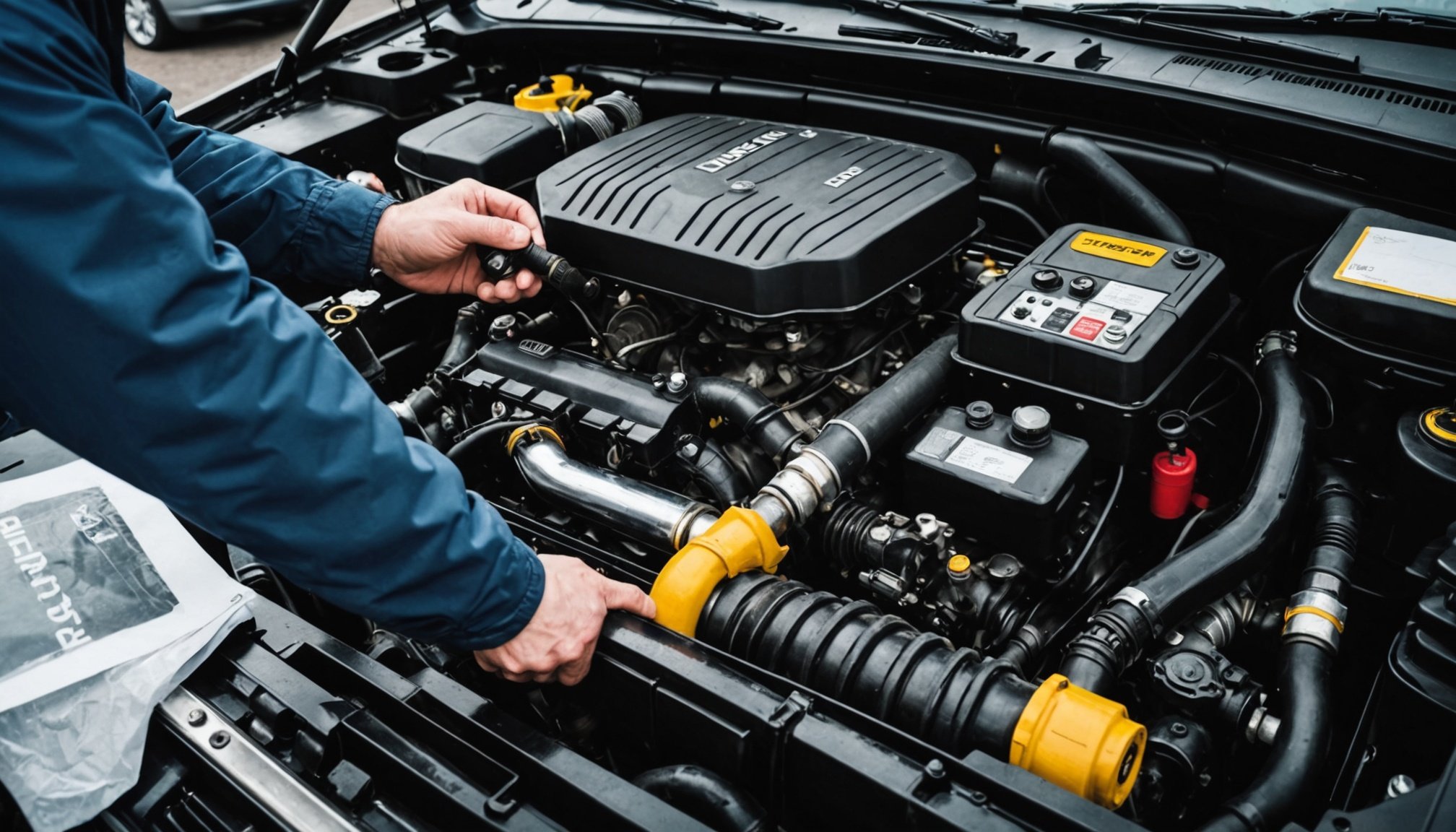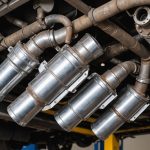Preparing Your Diesel Engine for Winter
Properly winterizing a diesel engine is essential for ensuring optimal performance and longevity, particularly in the UK’s chilly climate. The unique challenges of winter can significantly impact diesel vehicles, often leading to unexpected breakdowns or performance issues. To combat this, prioritizing diesel engine maintenance as the temperature drops becomes crucial.
Common Winter Challenges
Diesel engines face specific hurdles during colder months. Lower temperatures can cause diesel fuel to gel, disturbing flow and potentially clogging fuel filters. Additionally, cold weather can thicken engine oil, increasing pressure on the battery during startup.
Also read : Essential Tips for Safeguarding Your Vintage Car During the Harsh UK Winter Months
Benefits of Winter Diesel Preparation
Addressing these issues should be a primary focus. By preparing your diesel vehicle for winter, you ensure not only a smooth ride but also extend the life of the engine. Regular maintenance checks and using winter-grade diesel fuel can significantly reduce the chances of gelling. Moreover, investing in block heaters or fuel additives can assist in easier cold starts while protecting your battery from excessive strain.
These steps can guarantee that your diesel vehicle operates efficiently even in the harshest conditions, emphasising the importance of proactive winter diesel preparation for a trouble-free season.
This might interest you : Key Factors to Consider When Selecting a Windscreen Replacement Service in the UK
Fuel Considerations
When it comes to ensuring optimal diesel engine performance, fuel considerations become crucial, especially during winter months. Proper maintenance of fuel quality not only enhances efficiency but also prolongs engine life.
Choosing the Right Additives
Selecting diesel fuel additives is essential for maintaining engine reliability. Not all additives are created equal, and their effectiveness can vary. It’s advisable to choose products specifically designed for winter conditions, like anti-gel additives, which prevent fuel from thickening in cold temperatures. Consider additives that enhance fuel lubricity as well, ensuring smooth operation.
Benefits of Anti-Gel Additives
Anti-gel additives play a vital role in safeguarding engines from the challenges of cold weather. Fuel tends to gel at low temperatures, leading to clogs and operational difficulties. Anti-gel agents lower the fuel’s freezing point, thus maintaining flow and preventing potential engine damage. By incorporating these additives, you reduce the risk of engine stalls during freezing periods.
Maintaining Fuel Quality
Maintaining fuel quality demands diligent practices, especially in winter.
- Storing fuel in a clean, dry environment minimises contamination.
- Regular fuel filtration checks help preserve purity.
- Proactively treating stored diesel with winter-specific additives ensures it remains stable and ready for use, allowing for seamless vehicle operation throughout the colder months.
Battery Maintenance
Proper battery maintenance is crucial, especially in the winter months, for diesel engines. Cold weather significantly affects battery performance as lower temperatures can reduce a battery’s ability to generate power. Ensuring your diesel engine battery is in optimal condition is essential for reliable vehicle performance during chilly conditions.
Importance of Battery Health
In winter, the chemical reactions within a battery slow down, leading to reduced efficiency and increased strain, particularly for diesel engine batteries. This can result in potentially severe starting issues, leaving you stuck in the cold. Regular checks and maintenance can mitigate these issues.
Recommended Maintenance Practices
To maintain your battery’s efficiency during wintertime, consider the following practices:
- Regularly test the battery’s voltage to check if it is below the necessary range.
- Clean the battery terminals to prevent corrosion which can hinder performance.
- Ensure the battery is well-insulated to protect it from extreme cold.
Recognising Battery Issues
Look out for signs that may indicate problems, such as slow engine cranking, dim lights, or electrical issues. These can be early warnings of reduced winter battery care efficiency and may signal the need for a replacement. Ensuring a proactive approach will keep your vehicle running smoothly in colder climates.
Coolant System Checks
Proper coolant level maintenance is essential for safeguarding a diesel engine coolant system, particularly in colder climates. Regular checks ensure the system functions efficiently, preventing overheating or freezing.
Checking Coolant Levels
To maintain the correct coolant levels, inspect the reservoir when the engine is cool to avoid scalding. Ensure the fluid is between the maximum and minimum markers. If low, top up with the appropriate coolant mixture. Always engage the locking mechanism securely after closing the coolant cap.
Types of Coolant for Winter
In the UK, suitable winter coolant mixtures must endure freezing temperatures while protecting the engine. Look for products that combine antifreeze with corrosion inhibitors tailored for diesel engines. Such mixtures generally contain ethylene glycol and are ideal for temperatures often experienced during the colder months.
Flushing the Coolant System
Regularly flushing the coolant system is vital for maintaining efficiency. To do this, drain the old coolant, rinse the system with fresh water, and refill it with new coolant. This prevents deposits and debris from clogging the system, ensuring optimal performance and extending the life of the diesel engine. A well-maintained coolant system is not just about preventing freezing but also about enhancing the diesel engine’s longevity.
Engine Block Heaters
Using engine block heaters can transform how your diesel engine performs during the winter months. These heaters work by warming the engine block and its fluids before starting the engine, making cold starts easier and reducing wear and tear.
When it comes to engine block heater installation, choosing the right model is crucial. Consider your vehicle’s make and model to ensure compatibility. Installation usually involves securing the heater to the engine block, typically through a plug-in option. Professional installation might be wise for those unfamiliar with car mechanics, as this ensures the heater is properly connected, reducing the risk of damage.
For winter engine warming, it’s essential to plug your heater in about two hours before use. This significantly increases the engine’s efficiency and reduces emissions by ensuring the engine is at optimal temperature. To maximize effectiveness, leave your engine block heater plugged in overnight only in exceptionally cold climates, as this is usually unnecessary and inefficient.
Finally, remember to routinely check the heater’s connections and cords to avoid malfunction. This maintenance practice will ensure your diesel engine heating process is safe and effective throughout the cold weather.
Step-by-Step Winterization Checklist
Properly preparing your diesel engine for the colder months is crucial to ensure its performance and longevity. This winterization checklist provides essential vehicle maintenance tips and highlights key steps to follow.
Comprehensive Winter Preparation Steps
To start, inspect your diesel engine preparation components such as the fuel filter and glow plugs. Ensuring these are in good condition helps with cold starts. Check the antifreeze levels and radiator for any leaks, and use winter-grade diesel fuel or add anti-gel additives. It’s also important to examine the battery’s charge, as cold weather can reduce its capacity. A thorough check of tyre tread depth and pressure is advised, since maintaining optimal grip on icy roads is paramount.
Safety Precautions
When performing vehicle maintenance in winter, safety should be your top priority. Wear warm, insulated clothing to prevent exposure to low temperatures. Always work on a level surface to avoid accidental slips and ensure tools are easily accessible. Proper lighting is essential for visibility, especially in dim conditions.
Professional Recommendations
While the checklist offers a DIY approach, there are times when professional assistance is beneficial. For intricate tasks like engine diagnostics or specialised repairs, consulting a mechanic can provide peace of mind. Regular professional inspections can catch potential issues early, ensuring your vehicle is winter-ready.











